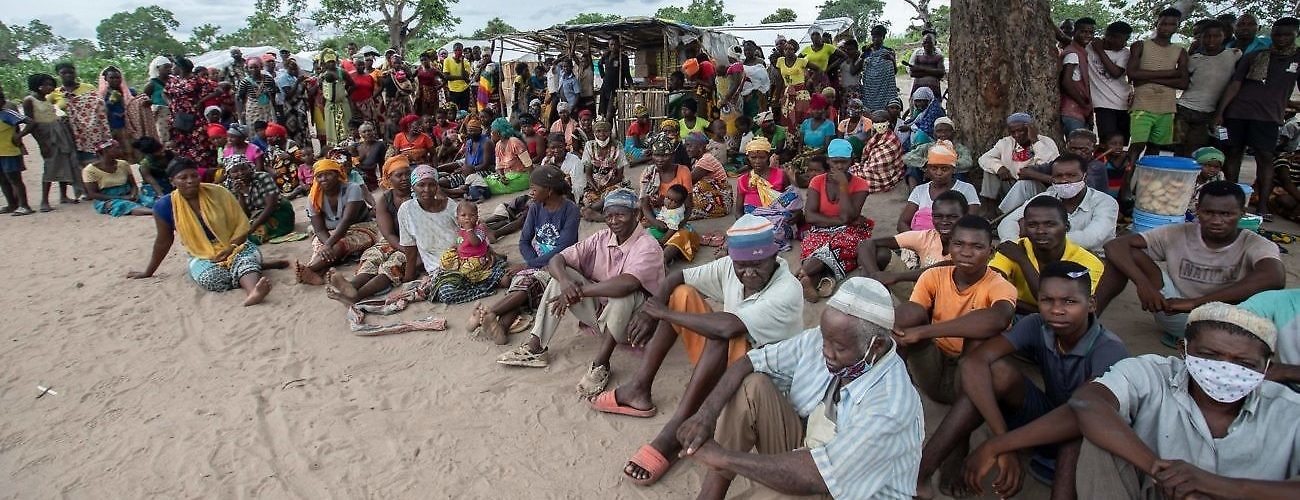Internally displaced persons gather for a community meeting in the Tara Tara district of Matuge, in northern Mozambique, on February 24, 2021. (ALFREDO ZUNIGA/AFP via Getty Images)
The Islamic State (ISIS) appears to be expanding its influence in Mozambique by solidifying its hold in one of the country’s most important provinces, according to a new report on insurgent operations along the south coast of Africa. The report reveals jihadists linked to ISIS, especially those operating under the name Al Sunnah wa Jama’ah (ASWJ), have consolidated their hold in Mozambique’s northern Cabo Delgado region and captured the city of Mocímboa da Praia last year. The fighters are now perpetrating attacks on the Afungi peninsula, only miles from energy giant Total’s operations, and targeting lines of communication and overrunning government outposts across the region.
Reports of ASWJ, a jihadist group advocating for the formation of an Islamic State in the Cabo Delgado, is raising concern that the region could become isolated from the rest of the country. This would pose critical threats to the liquid natural gas (LNG) operations in the area, which have already forced Total to evacuate its personnel from the area. The immediate economic damage also impacts future investment—e.g., ExxonMobil has delayed its final decision about investing in the region—and places Mozambique’s economic development efforts in jeopardy. The human costs are equally troubling, as more than 565,000 people have so far been forced to flee their homes and villages, abandoning their crops and livelihoods.
When ASWJ was formed in 2008 primarily by followers of Sheikh Rogo—a Kenyan Muslim cleric who reportedly assisted in the United States embassy bombings in Nairobi and Dar es Salaam in 1998, and was later sanctioned by the US and United Nations for providing support to al-Shabaab in Somalia—the group mainly advocated for the formation of an Islamic State in a peaceful manner. But following Rogo’s death in 2012, many of his followers reportedly moved to northern Mozambique, where they ensured that a number of mosques in Mocimboa da Praia, a district in Cabo Delgado province, adopted Rogo’s interpretation of Islam.
ASWJ gradually expanded its presence in the region, resorting to violence and carrying out its first attack in October 2017—a surprise assault on a police station in Mocimboa da Praia—and continued to target government facilities through 2018 before pledging its allegiance to ISIS in the summer of 2019. It then became part of the so-called Islamic State Central Africa Province (ISCAP). The use of brutal tactics by jihadists in this time, such as beheadings, kidnappings, and reports of paying elderly civilians to leave and not return—similar to those used by ISIS in other parts of the world—show close and disturbing connections with the Islamic State.
The growth of ASWJ in Cabo Delgado can be linked to its manner of operation in the region. Its militants build relationships with the local populace and then use that relationship to exert influence over them. ASWJ took advantage of the high poverty rate in Cabo Delgado’s Kimwani tribe to swell its ranks. Potential fighters were lured with financial incentives and even offered monthly wages— efforts that have swelled its ranks in the region.
The responses from the government of Mozambique have not been adequate enough to address the scale of the problem. There has also been worrisome news of human rights abuses committed by government forces as they have intervened. Not only has this added to local resentment of President Filipe Nyusi’s administration, but it will undoubtedly further fill the ranks of the jihadists groups as they continue to provide economic stability and a sense of safety.
Mozambique desperately needs the support of other countries in Southern Africa in fighting the growing insurgency before its spills over its borders. It is clear that the government lacks the resources and approach needed to deal with the security issues in Cabo Delgado, and has itself created humanitarian problems. Other members of the Southern African Development Community (SADC) can help ensure that what is currently a national challenge does not expand to become an international insurgency. So far, leaders of the 16-country economic bloc have agreed to respond to the insurgency, but there’s very little clarity on what they actually hope to achieve.
With support from its regional neighbors, Mozambique can work to address the fundamental issues facing the people in Cabo Delgado, particularly those from the Kimwani tribe. Without support, the bandwidth of the Mozambican government will only be enough to respond militarily, and in a limited way. SADC countries can also condition any assistance to Mozambique on guarantees that security forces will be held accountable for any crimes they commit, thereby mitigating the humanitarian fallout and possibly impeding ASWJ’s recruitment efforts.
A lack of concrete action could turn southeast Africa into an unstable region akin to parts of West Africa—and poses particular risk to Malawi, Tanzania, and Zambia. Mozambique and the entire SADC must draw on the lessons from responding to Boko Haram, which was a less dangerous group until a very poor response by the Nigerian government to its movement encouraged the sect to extend its operations to Chad, Niger, and Cameroon. Similarly, the handling of the insurgency in Mali enabled jihadists to spread their activities to Burkina Faso and western Niger, contributing to the instability in the Sahel. If Mozambique and the rest of SADC fail to act quickly and convincingly, activities of ASWJ will have far reaching consequences for the entire region.





